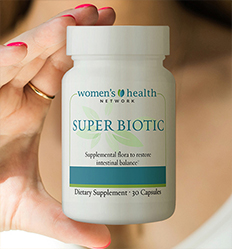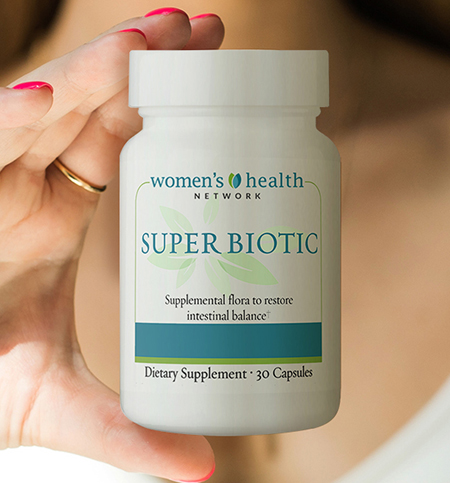Authored by Dr. Sharon Stills, NMD
Are digestive symptoms running your life? If foods that trigger gas, bloating and heartburn now outnumber foods that don’t, or you find yourself mentally cataloging the location of the nearest bathroom whenever you go out, these are signs that you need a different approach to supporting your gut health.

Symptoms of a gut health imbalance
Some signs of GI issues are hard to miss. However, other symptoms, especially those related to gut flora imbalance and issues with the gut microbiome, might surprise you. Signs that you need to check in on the health of your gut include:
- Cramps
- Diarrhea
- Constipation
- Heartburn and acid reflux
- Bloating and gas
- Stomach pains
- Food sensitivities to gluten, dairy or other foods
- Chronic bad breath
- Yeast infections
- Cold sores
- Urinary tract infections
- Headaches
- Migraines
- Joint aches
- Poor immunity
- Skin problems like rosacea and acne
Natural supplements for gut health
Finding answers to GI issues is often tricky. Eating a healthy diet rich in fiber, whole grains and probiotics is a first line of support for improving intestinal gut flora and overall gut health. Enzymes and other natural compounds can help with even the worst digestive distress symptoms. Additionally, herbal remedies like ginger, licorice and chamomile tea can provide in-the-moment relief from bloating, gas and heartburn, especially after rich meals.
Here’s a closer look at the best natural supplements for gut health that help you finally find real relief from your digestive symptoms.
Probiotics
Probiotics are live bacteria (flora) that are good for your digestive system. Beneficial gut flora helps your GI tract to break down fiber, which boosts nutrient absorption and produces beneficial short-chain fatty acids and vitamins. Probiotics assist with digestion of difficult to metabolize foods (i.e., lactose-containing foods).
Probiotics also help the gut microbiome by crowding out harmful bacteria. A healthy gut microbiome is essential for improved nutrient absorption and for overall health, as the microbiome plays a role in regulating the immune system, managing inflammation, and producing neurotransmitters that affect mood and brain function.

If you are struggling with gas, bloating, diarrhea and also problems like acne or depression and anxiety, there is a good chance that you have a gut flora imbalance – a sign that you need more probiotics.
Probiotics can be found naturally in fermented foods such as yogurt, kefir, sauerkraut and kimchi. If you don’t eat many of these foods or you are experiencing digestive distress symptoms you can also take probiotic supplements. Look for a high quality probiotic supplement that contains multiple strains of bacteria, as different strains have different benefits. Some of the best probiotic strains for gut health include Lactobacillus acidophilus, Bifidobacterium lactis and Streptococcus thermophilus.
Prebiotics
Prebiotics are a type of fiber that the body can’t digest but that the gut microbiome can. They serve as food for the beneficial bacteria in the gut, helping them to thrive and multiply. Some of the best sources of prebiotics include chicory root, dandelion greens, garlic, onions, leeks and asparagus.
If you’re not getting enough prebiotics in your diet, you can also take prebiotic supplements. Look for supplements that contain inulin or fructooligosaccharides (FOS), which are two types of prebiotic fibers that are well-tolerated and effective.
Digestive enzymes
Digestive enzymes are proteins that help break down food in the digestive tract. They are produced by the pancreas, stomach and small intestine. However, some people don’t produce enough digestive enzymes, which can lead to digestive problems such as bloating, gas and indigestion.
Digestive enzyme supplements can help improve gut health by aiding in the breakdown of food. Look for supplements that contain a combination of different enzymes, including protease, amylase, lipase, lactase and cellulase. These enzymes help break down proteins, carbohydrates, fats, lactose and fiber, respectively.
L-glutamine
L-glutamine is an amino acid that is essential for gut health. It is the most abundant amino acid in the body and is used to fuel the cells that line the digestive tract. Glutamine helps to strengthen the intestinal barrier, which is important for preventing harmful substances from entering the bloodstream.
Glutamine supplements can help improve gut health by supporting the growth and repair of the intestinal lining. Look for a supplement that specifically contains L-glutamine, which is the form of glutamine that is most easily absorbed by the body.
Curcumin
Curcumin is a natural compound found in turmeric, a spice common to Indian cuisine. The powerful anti-inflammatory properties of curcumin have been shown to reduce inflammation in the gut, which is related to a number of digestive problems, including inflammatory bowel disease (IBD) and irritable bowel syndrome (IBS). Curcumin may have special benefits for people with leaky gut syndrome by deactivating damaging compounds and helping to close holes in the gut lining. Curcumin also helps to restore the gut microbiome and positively influence the “microbiota–gut–brain axis,” a bidirectional system of communication between the gut and brain.
To supplement with curcumin, look for antioxidant supplements that contain a high concentration of curcuminoids.
Vitamin C
Vitamin C is an antioxidant that plays a crucial role in maintaining gut health. It can help to reduce inflammation in the gut, improving the gut barrier and its ability to absorb nutrients from the foods you eat. Vitamin C has been known to help balance out the good and bad bacteria inside the gut, resulting in better digestion and a healthier gut microbiome. To get more Vitamin C, eat more leafy green vegetables. Their fiber is also a pre biotic!
Chamomile/Ginger
These two plants have been used for centuries to treat digestive issues. Ginger and chamomile both help to soothe the digestive tract and reduce inflammation. Chamomile can help to reduce stress and promote relaxation, which can also improve digestion. A study of people with anxiety taking chamomile supplements found that chamomile was effective for treating their symptoms. Ginger has added benefits of antimicrobial activity that helps to protect your gut from pathogenic microorganisms and spoilage in foods that can lead to food poisoning. It also helps to reduce nausea and promote the production of digestive enzymes.
Herbal support for bacteriophages
The sugar substitute stevia is a replacement for gut-harming sugar, but it is also a pro-gut health substance all on its own. Stevia has been show to activate “bacteriophages” that live in the gut microbiome. Bacteriophages are an ancient type of virus that specifically target harmful bacteria in the gut, while leaving beneficial bacteria untouched. By reducing harmful flora, bacteriophages improve gut flora balance and reduce the risk of digestive issues. Licorice, another herb used for digestion, and the culinary herb oregano can also help to “wake up” bacteriophages.
Artichoke
Artichoke helps to promote the production of digestive enzymes and improve digestion. Additionally, artichoke can help to reduce inflammation in the gut and improve overall gut health. Artichoke can be found as a powdered supplement or simply add more artichoke to your diet.
Our tips and recommendations for improving gut health
Start with diet
When you have a problem with gut health, it almost always means that somewhere at the root of your problem is a gut flora imbalance. Gut flora is highly influenced by diet. Eating a diet with too much processed food and excess sugar harms gut flora balance, triggering issues ranging from poor nutrient absorption to weakened immunity, joint aches, depression and anxiety, and yeast overgrowth. Sugar and other artificial additives and chemical preservatives also increase inflammation in the body, contributing to (and worsening) autoimmune issues.
At the same time you kick sugar to the curb, increase in your diet foods that are prized for replenishing probiotics. Start with the “4 Ks” of kefir, kimchi, kvass and kombucha. Yogurt, sauerkraut and other fermented veggies are some other good choices.

Reduce stress
Whenever the body’s stress response is activated, digestion is suppressed so the body can reroute blood flow to the limbs in case it’s necessary to flee from danger. The central nervous system shuts down digestion by slowing contractions of digestive muscles and decreasing secretions for digestion. After the stress has past, the system recovers and digestion resumes.
This ancient response works wonders when we need to flee from a charging bear, but when facing the chronic stress of modern life, an over-triggered stress response can keep us in a semi-permanent state of poor digestion. Taking steps to reduce stress in your life, as well as engaging in stress-busting practices like yoga and meditation, can help your brain turn your digestion back on to full strength.
Pay attention to the gut-hormone connection
In women, digestive issues can also be connected to hormonal imbalance. During perimenopause and menopause, hormonal fluctuations or imbalances can influence the pace of food movement through the intestines. For example, constipation can be a sign of low progesterone. A gut flora imbalance can also interfere with hormone production. Gut flora helps to regulate estrogen. When your balance of healthy microorganisms is off, it can result in imbalances in estrogen levels too. The bottom line? If you are taking steps to rebalance your hormones, pay attention to your gut health too.
Need help identifying your digestive symptoms? Take our Digestive Health Quiz to assess your gut health and find out the first steps you can take to feel better!












